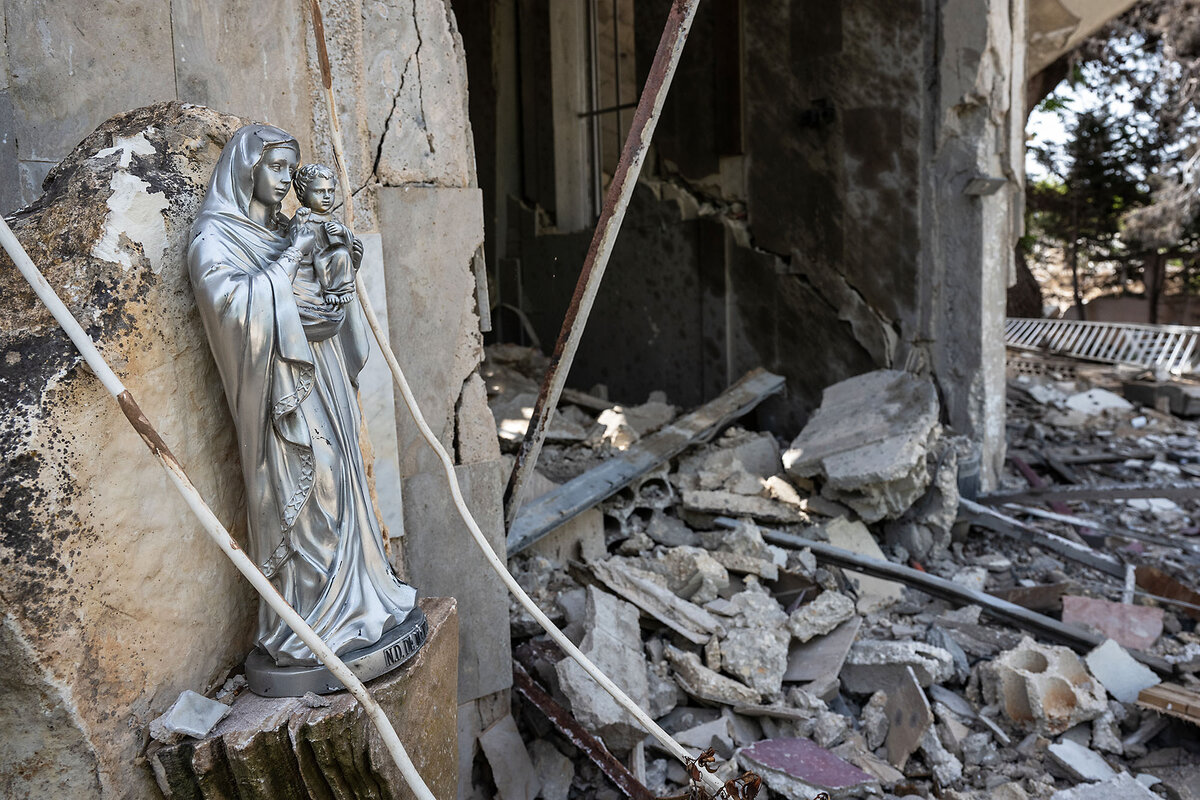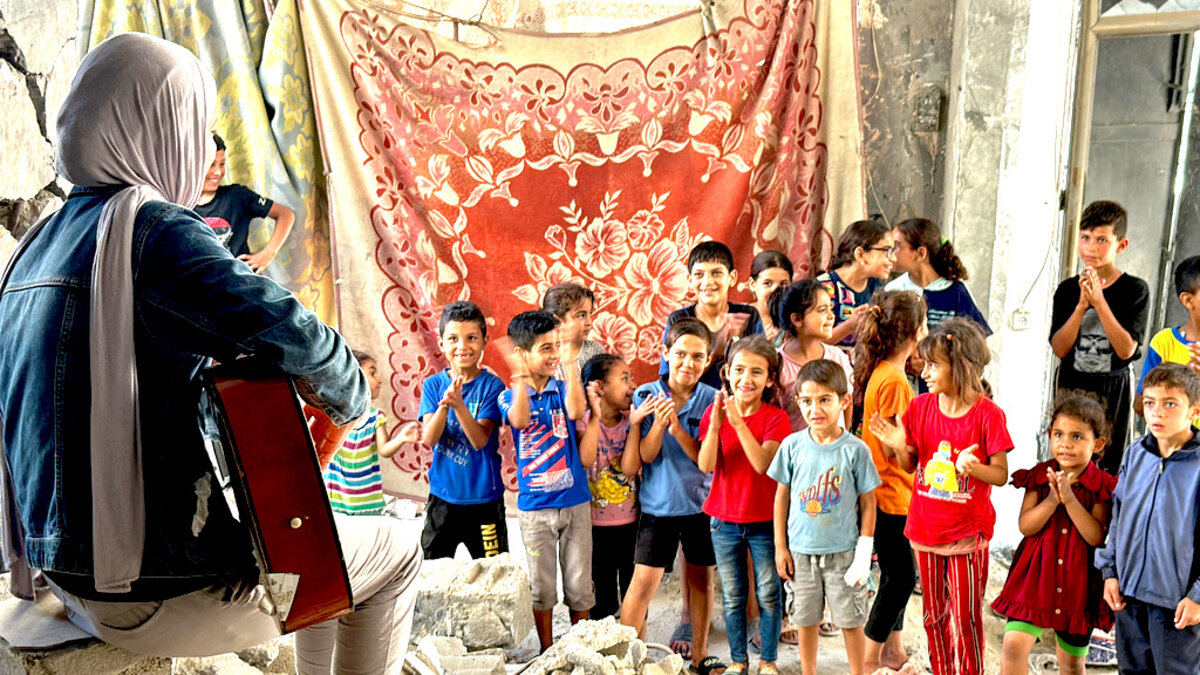War is often portrayed as a man’s world. But in Ukraine, women like Ananda, a drone commander on the Donetsk front, are providing leadership with their own unique courage and expertise.

Why is Christian Science in our name?
Our name is about honesty. The Monitor is owned by The Christian Science Church, and we’ve always been transparent about that.
The Church publishes the Monitor because it sees good journalism as vital to progress in the world. Since 1908, we’ve aimed “to injure no man, but to bless all mankind,” as our founder, Mary Baker Eddy, put it.
Here, you’ll find award-winning journalism not driven by commercial influences – a news organization that takes seriously its mission to uplift the world by seeking solutions and finding reasons for credible hope.
Explore values journalism About usMonitor Daily Podcast
- Follow us:
- Apple Podcasts
- Spotify
- RSS Feed
- Download
 Mark Sappenfield
Mark Sappenfield
Every day, the Monitor has a budget – a list of stories we plan to publish. The top story on today’s budget starts with these words: “Former middle-class housewife turned combat zone commander ...” I was hooked.
I don’t really want to talk about the article. I want you to read it. It is a remarkable portrait of the front lines in Ukraine, and a view of the world often the Monitor alone provides. It has drones and hardship, jokes, and code names – like Splash, Pikachu, and Mechanic.
The code name for the housewife-turned-commander? Joy. This is not your ordinary war story.
Already a subscriber? Log in
Help fund Monitor journalism for $11/ month
Monitor journalism changes lives because we open that too-small box that most people think they live in. We believe news can and should expand a sense of identity and possibility beyond narrow conventional expectations.
Our work isn't possible without your support.
Today’s stories
And why we wrote them
( 5 min. read )
Today’s news briefs
• Merrick Garland rebuke: House Republicans vote to hold Attorney General Merrick Garland in contempt of Congress for refusing to turn over audio of President Joe Biden’s interview in his classified documents case.
• Tulsa reparations: The Oklahoma Supreme Court dismisses a lawsuit of the last two survivors of the 1921 Tulsa Race Massacre who were seeking reparations.
• Haitian Cabinet: Haiti’s administration picks new ministers, rounding out the new prime minister’s Cabinet, in a stark departure from the previous government as the country battles a deep humanitarian crisis fueled by armed gangs.
• U.N. list of offenders against children: United Nations Secretary-General António Guterres names Israel’s armed and security forces, Hamas, Islamic Jihad, and Sudan’s warring parties for killing and maiming children in 2023.
( 5 min. read )
Guatemala’s new President Bernardo Arévalo pledged to clean up corruption. Facing down a hostile attorney general, he’s realizing that his anti-corruption agenda will take more than just political will and popular support.

( 6 min. read )
It’s a recurring theme in warfare: the plight of noncombatant civilians caught in the crossfire. In southern Lebanon, Christian villagers say Hezbollah’s tactics make them vulnerable to destructive Israeli salvos.
( 8 min. read )
If English is the next universal coding language, as Nvidia’s CEO suggested, why, English academics ask, are they not being valued as were computer programmers during earlier tech booms?
In Pictures
( 3 min. read )
The big dunes – and the views they offer – are often the stars in this Namibian national park. But dawn here is breathtaking from any vantage point.
The Monitor's View
( 2 min. read )
A touching news video went viral on June 11. It shows a young Palestinian woman playing songs on a guitar for a group of smiling children in the ruins of a building in Gaza. The children clap with joy and jump about in a brief moment of freedom from fear.
The woman, medical student Rahaf Nasser, told Reuters that – after losing her childhood toys in a war triggered by the Hamas attack on Israel – she wanted to prove that “our children love to live, love to be alive, to play with each other.” An estimated half of the people in Gaza are children.
June 11 also happened to be the first International Day of Play. The annual observance was designated in March by the United Nations General Assembly as a way to celebrate and promote a child’s natural instinct for play.
Ensuring that children have opportunities to play in conflict zones – which last year numbered 59 worldwide – has become a global campaign for UNICEF. In Ukraine and in seven countries hosting Ukrainian refugees, for example, the U.N. agency puts a priority on nonformal learning, such as creating places to play, for the youngest children.
“Play is how children learn to navigate the world,” the agency stated. “It helps them to build narratives, knowledge and social skills and contributes to their overall development.”
It also helps preserve their innocence as long as possible, especially in world trouble spots. And it helps restore people’s hope in innocence after a conflict. When parents see a child having fun, it gives them confidence that their child will recover.
UNICEF has become creative in how it promotes play in war zones and disaster areas. It has redesigned cardboard boxes for food aid to include removable inserts that can be repurposed as pop-out toys, such as animal blocks and two disks to make a rolling ball.
The declaration of an International Day of Play may seem odd to many. Yet in war, playtime for kids is often the first casualty. Despite the destruction and high death toll in Gaza, several groups are now offering playful activities, such as informal soccer matches. A performance troupe, Free Gaza Circus, is sending clowns into refugee areas to do acrobatics and make jokes.
A child’s joy during play may not end a war. But the expression of innocence can help defeat a war’s aftereffects.
A Christian Science Perspective
Each weekday, the Monitor includes one clearly labeled religious article offering spiritual insight on contemporary issues, including the news. The publication – in its various forms – is produced for anyone who cares about the progress of the human endeavor around the world and seeks news reported with compassion, intelligence, and an essentially constructive lens. For many, that caring has religious roots. For many, it does not. The Monitor has always embraced both audiences. The Monitor is owned by a church – The First Church of Christ, Scientist, in Boston – whose founder was concerned with both the state of the world and the quality of available news.
( 3 min. read )
We’re all inherently capable of letting divine Love, rather than self-righteousness or resentment, lead the way in our interactions – which fosters harmony.
Viewfinder
Palestinian children play during the Eid al-Adha holiday, in Gaza City, June 6, 2025.

A look ahead
Thank you for joining us today. Please come back tomorrow when Sarah Matusek visits Colorado’s most competitive swing district. Is President Joe Biden’s recent action on the southern border enough to move the needle for local voters, or too little too late?







